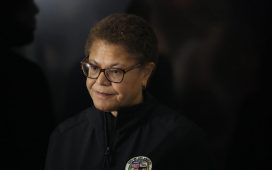With help from Stephanie Beasley, Brianna Gurciullo and Tanya Snyder
Editor’s Note: This edition of Morning Transportation is published weekdays at 10 a.m. POLITICO Pro Transportation subscribers hold exclusive early access to the newsletter each morning at 6 a.m. Learn more about POLITICO Pro’s comprehensive policy intelligence coverage, policy tools and services, at politicopro.com.
— The NTSB’s safety recommendations from its Boeing 737 MAX review meant something different depending on who you asked on Capitol Hill.
— FAA leaders are under pressure from Congress for delays in implementing many sections of its reauthorization enacted last year.
— Republicans on the House Oversight Committee criticized Democrats for launching an investigation into Transportation Secretary Elaine Chao.
HAPPY FRIDAY: Thanks for tuning in to POLITICO’s Morning Transportation, your daily tipsheet on all things trains, planes, automobiles and ports. Get in touch with tips, feedback or song lyric suggestions at smintz@politico.com or @samjmintz.
LISTEN HERE: Follow MT’s playlist on Spotify. What better way to start your day than with songs (picked by us and readers) about roads, rails, rivers and runways.
NTSB REVIEW DIVIDES OPINION: The recommendations to the FAA in the wake of two Boeing 737 MAX crashes divided opinion on Capitol Hill. The recommendations, published Thursday, focused on pilot response to uncommanded flight control inputs amid a host of alerts in the cockpit. Our Tanya Snyder reports:
Top Republicans on the House Transportation Committee suggested it vindicated their focus on pilot error as a major factor in the fatal crashes. “As a pilot, this is something I have been concerned about for some time — how dependent pilots are on technology to fly planes versus how much pilots can rely on their fundamental training to take manual control of aircraft when technology fails,” ranking member Sam Graves (R-Mo.) said.
But to some Democrats, like Sen. Richard Blumenthal (D-Conn.), it was an indictment of “mutual, cascading failures by both the FAA and Boeing.” He said in a statement that NTSB’s review shows that “Boeing’s continued evasiveness and the FAA’s broken safety system are among the deeply significant issues that must be addressed before 737 MAX aircraft are allowed to fly again.”
FAA FRUSTRATION ON DISPLAY IN HOUSE: The House Transportation Committee had a chance on Thursday to press FAA officials about implementation of the agency’s reauthorization, and members took the opportunity with gusto. Here’s some of what we learned:
Deputy Administrator Dan Elwell blamed an unwieldy rulemaking process for delays in tweaking existing rules to require a minimum 10-hour rest period for flight attendants, which has been a priority of lawmakers and unions since the bill was signed into law last year.
In her testimony, Sara Nelson, the international president of the Association of Flight Attendants-CWA, said Frontier Airlines, PSA Airlines and Miami Air International have “ratified agreements” that reflect the reauthorization. “But there is a big difference between having negotiated contract language and having a regulation that the airlines must follow,” Nelson told lawmakers. “All that the FAA needs to do, based on all of the data that we already have … is simply follow the direction of Congress to update the rule and force the airlines to implement the rest.”
As for drones, Elwell suggested the delay of a proposed rule on remote identification is partly Congress’ fault. The reauthorization nixed an exemption for model aircraft, which Elwell said “caused us to basically start almost from scratch on writing the provision.” He also pointed to technical and law enforcement issues.
Lawmakers expressed other frustrations throughout the hearing, including that the FAA hasn’t implemented statutory mandates on seat pitch and airplane evacuations. “We don’t need to have another crisis like we had with the Boeing airplane — that we have a crash and we come back and we have to ask the FAA, ‘People couldn’t get out of the plane in 90 seconds. Why did you not comply [with the law]?’” Rep. Steve Cohen (D-Tenn.) said.
Other aviation industry groups testified on a second panel, and an official from the Air Line Pilots Association said a working group on secondary cockpit barriers was a “waste of resources” and a delay tactic.
PARTISAN DIVIDE: House Oversight Republicans slammed their Democratic colleagues for launching what they said is a politically motivated investigation into Chao. In a letter sent Thursday, Reps. Jim Jordan (R-Ohio) and Mark Meadows (R-N.C.) wrote that the probe, which is looking into whether Chao has used her office to benefit her family’s shipping company, is “nothing more than an attempt to manufacture controversy to smear Secretary Chao and her family.” They also said that Democratic committee leaders (who did not immediately respond to requests for comment) didn’t consult them before starting the investigation, Tanya reports.
BOEING WAFFLING ON CEO TESTIMONY: House Transportation Chairman Peter DeFazio (D-Ore.) is still waiting for a definitive answer from the company after he asked executives to testify at a hearing on the MAX. “Apparently we do not have an ironclad acceptance yet to voluntary appearance,” DeFazio said. “And if they won’t voluntarily appear, they will otherwise appear by subpoena. And they can’t claim we don’t have a legislative purpose.” Our Brianna Gurciullo has more.
NEW AND IMPROVED: The FHWA published an updated rule on Thursday that will give states more flexibility in which products and services they can use for federally funded highway projects, according to the agency. The changes to the century-old rule, which take effect Oct. 28, will remove restrictions on states from using patented or proprietary technology.
In other rules: NHTSA is now taking comment on an ongoing rulemaking mandated by Congress in 2012 that would require cars to have a seat belt use warning system for rear seats.
INSOURCING: As Congress closes in on banning railcars (and possibly buses) from Chinese-subsidized companies, the China General Chamber of Commerce-Chicago gave the U.S. subsidiary of the massive China Railway Rolling Stock Corporation its “Employer of the Year” award last week. The award recognized CRRC Sifang America’s “investment in local hiring, extensive high-tech training for its workforce, and successful effort to return passenger railcar manufacturing jobs to Chicago after a more than 50-year absence.” The company employs about 80 workers at its new facility on the southeast side of Chicago.
DENIED: Senate appropriators on Thursday advanced a fiscal 2020 DHS spending bill but rejected an amendment that would have redirected some border wall spending to TSA, Coast Guard and CBP. The amendment from Sen. Jon Tester (D-Mont.) was shot down 14-17, per our Stephanie Beasley.
There’s more: In the report accompanying the bill, appropriators said they would support requirements that drones used in the interest of national security must be U.S.-made. They also pressed DHS to begin reviewing alternatives to foreign-made drones. They also want CBP to begin issuing annual public reports with data on its border searches of electronic devices owned by U.S. citizens and non-citizens.
Another story from Stephanie: The Coast Guard sent to OMB a proposed rule that would delay implementation of regulations requiring biometric card readers for transportation worker IDs.
MOVING ON UP: The House passed a slew of travel-related bills by voice vote on Thursday, including two bills aimed at making air travel easier for parents. H.R. 3694 (116) would require TSA agents be trained to screen pregnant people and small children. And H.R. 3246 (116) would mandate a federal review of TSA’s rules for screening baby formula and other nursing products.
REAL ID, REAL TROUBLE: Seventy-two percent of Americans are unprepared for next year’s Real ID deadline, according to a new study commissioned by the U.S. Travel Association. That’s the number of people who either don’t have a compliant license or don’t know if they do.
— “GM reverses decision, will pay striking union workers’ healthcare coverage.” Reuters.
— “Uber adds more services to its app in its quest for profit.” Associated Press.
— “Nissan’s CEO search focuses on three candidates.” Wall Street Journal.
— “This airline’s baby map allows passengers to avoid young fliers. Will others follow suit?” Washington Post.
— “Jaguar Land Rover put fake ‘virtual eyes’ on self-driving cars to try to make humans trust them more.” Business Insider.
DOT appropriations run out in 4 days. The FAA reauthorization expires in 1,466 days. Highway and transit policy is up for renewal in 371 days.








